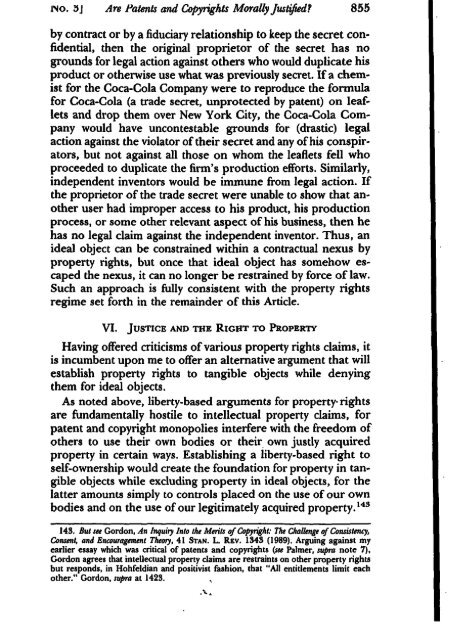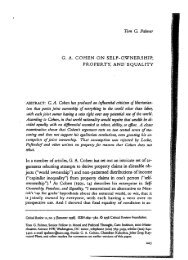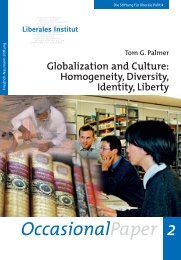Are Patents and Copyrights Morally Justified? - Tom G. Palmer
Are Patents and Copyrights Morally Justified? - Tom G. Palmer
Are Patents and Copyrights Morally Justified? - Tom G. Palmer
Create successful ePaper yourself
Turn your PDF publications into a flip-book with our unique Google optimized e-Paper software.
NO. ~J <strong>Are</strong> <strong>Patents</strong> <strong>and</strong> <strong>Copyrights</strong> <strong>Morally</strong> Ju,ct~fid? 855<br />
by contract or by a fiduciary relationship to keep the secret confidential,<br />
then the original proprietor of the secret has no<br />
grounds forlegal action against others who would duplicate his<br />
product or otherwiseuse what was previously secret. If a chemist<br />
for the Coca-Cola Company were to reproduce the formula<br />
for Coca-Cola (a trade secret, unprotected by patent) on leaflets<br />
<strong>and</strong> drop them over New York City, the Coca-Cola Company<br />
would have uncontestable grounds for (drastic) legal<br />
action against the violator oftheir secret<strong>and</strong> any ofhis conspirators,<br />
but not against all those on whom the leaflets fell who<br />
proceeded to duplicate the firm’s production efforts. Similarly,<br />
independent inventors would be immune from legal action. If<br />
the proprietor ofthe trade secret were unable to show that another<br />
user had improper access to his product, his production<br />
process, or some other relevant aspect of his business, then he<br />
has no legal claim against the independent inventor. Thus, an<br />
ideal object can be constrained within a contractual nexus by<br />
property rights, but once that ideal object has somehow escaped<br />
the nexus, it can no longer be restrained by force oflaw.<br />
Such an approach is fully consistent with the property rights<br />
regime set forth in the remainder of this Article.<br />
VI. JUSTICE AND THE RIGHT TO PROPERTY<br />
Having offered criticisms of various property rights claims, it<br />
is incumbentupon me to offer an alternative argument that will<br />
establish property rights to tangible objects while denying<br />
them for ideal objects.<br />
As noted above, liberty-based arguments for property’ rights<br />
are fundamentally hostile to intellectual property claims, for<br />
patent <strong>and</strong> copyright monopolies interfere with the freedom of<br />
others to use their own bodies or their, own justly acquired<br />
property in certain ways. Establishing a liberty-based right to<br />
self-ownership would create the foundation for property in tangible<br />
objects while excluding property in ideal objects, for the<br />
latter amounts simply to controls placed on the use of our own<br />
bodies <strong>and</strong> on the use ofour legitimately acquired property.’ 43<br />
148. But see Gordon, An Inquiry Into the Merits of Copyright: The Challengeof Consisteney,<br />
Consent, <strong>and</strong> Encouragement Theoty, 41 SI-AN. L. REV. 1843 (1989). Arguing against my<br />
earlier essay which was critical of patents <strong>and</strong> copyrights (see <strong>Palmer</strong>, supra note 7),<br />
Gordon agrees that intellectual property claims are restraints on other property rights<br />
but responds, in Hohfeldian <strong>and</strong> positivist fashion, that “All entitlements limit each<br />
other” Gordon, supra at 1428.











